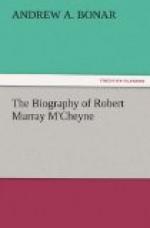He might have risen to high eminence in the circles of taste and literature, but denied himself all such hopes, that he might win souls. With such peculiar talents as he possessed, his ministry might have, in any circumstances, attracted many; but these attractions were all made subsidiary to the single desire of awakening the dead in trespasses and sins. Nor would he have expected to be blessed to the salvation of souls unless he had himself been a monument of sovereign grace. In his esteem, “to be in Christ before being in the ministry” was a thing indispensable. He often pointed to those solemn words of Jeremiah (23:21): “I have not sent these prophets, yet they ran; I have not spoken to them, yet they prophesied. But if they had stood in my counsel, and caused my people to hear my words, then they should have turned them from their evil way, and from the evil of their doings.”
It was with faith already in his heart that he went forward to the holy office of the ministry, receiving from his Lord the rod by which he was to do signs, and which, when it had opened rocks and made waters gush out, he never failed to replace upon the ark whence it was taken, giving glory to God! He knew not the way by which God was leading him; but even then he was under the guidance of the pillar-cloud. At this very period he wrote that hymn, They sing the song of Moses. His course was then about to begin; but now that it has ended, we can look back and plainly see that the faith he therein expressed was not in vain.
CHAPTER II
HIS LABORS IN THE VINEYARD BEFORE ORDINATION.
“He that goeth forth and
weepeth, bearing precious seed, shall
doubtless come again with rejoicing,
bringing his sheaves with
him.”—Ps. 126:6.
While he was still only undergoing a student’s usual examinations before the Presbytery, in the spring and summer of 1835, several applications were made to him by ministers in the Church, who desired to secure his services for their part of the vineyard. He was especially urged to consider the field of labor at Larbert and Dunipace, near Stirling, under Mr. John Bonar, the pastor of these united parishes. This circumstance led him (as is often done in such cases) to ask the Presbytery of Edinburgh, under whose superintendence he had hitherto carried on his studies, to transfer the remainder of his public trials to another Presbytery, where there would be less press of business to occasion delay. This request being readily granted, his connection with Dumfriesshire led him to the Presbytery of Annan, who licensed him to preach the gospel on 1st July 1835. His feelings at the moment appear from a record of his own in the evening of the day: “Preached three probationary discourses in Annan Church, and, after an examination in Hebrew, was solemnly licensed to preach the gospel by Mr. Monylaws, the moderator. ’Bless the




